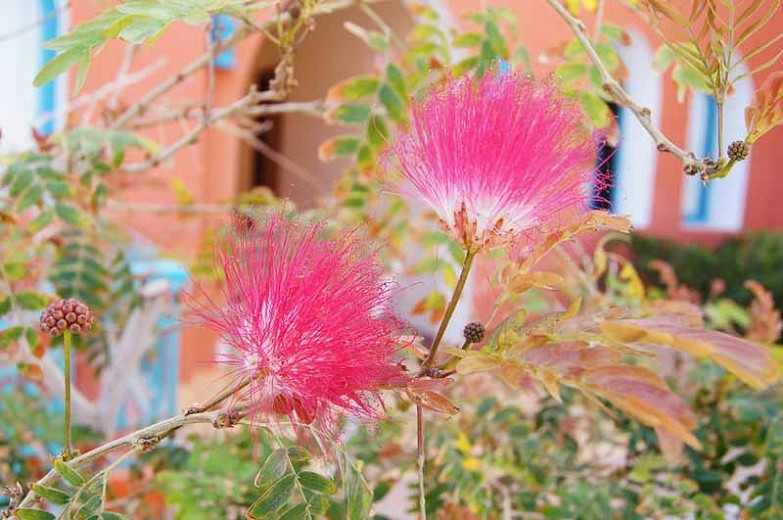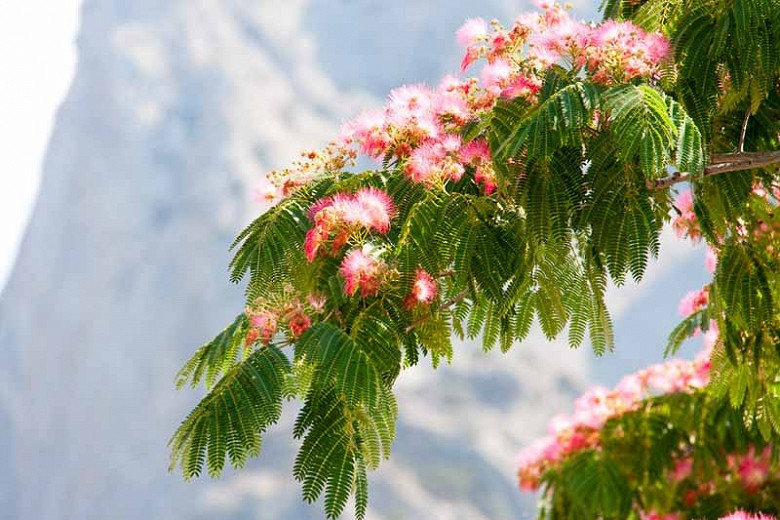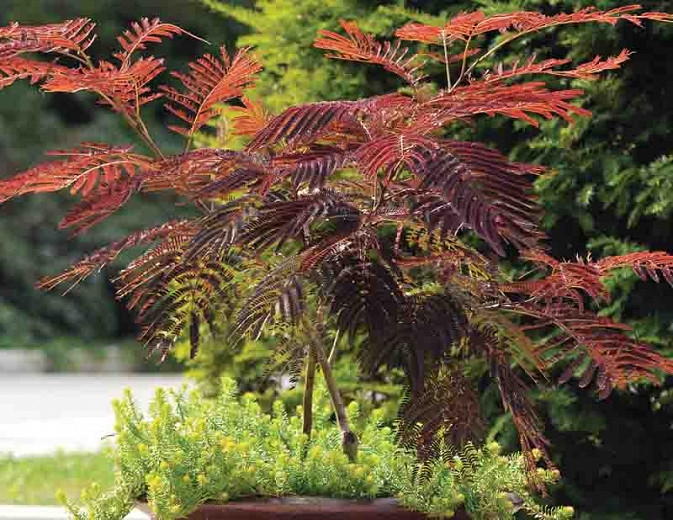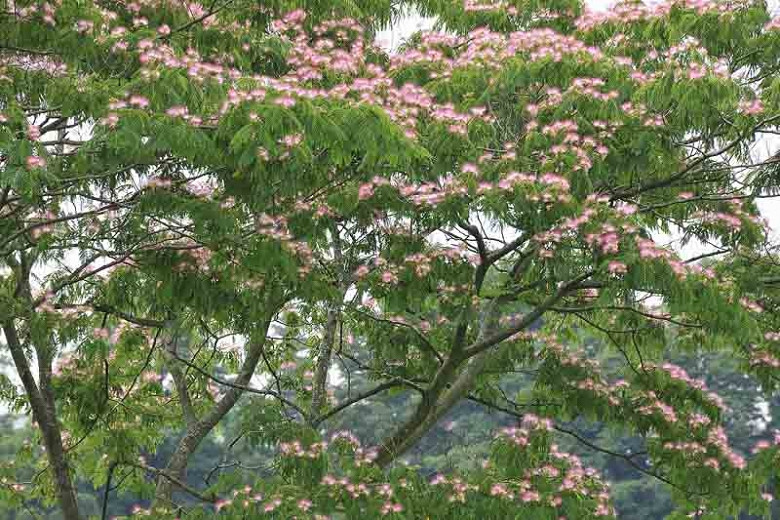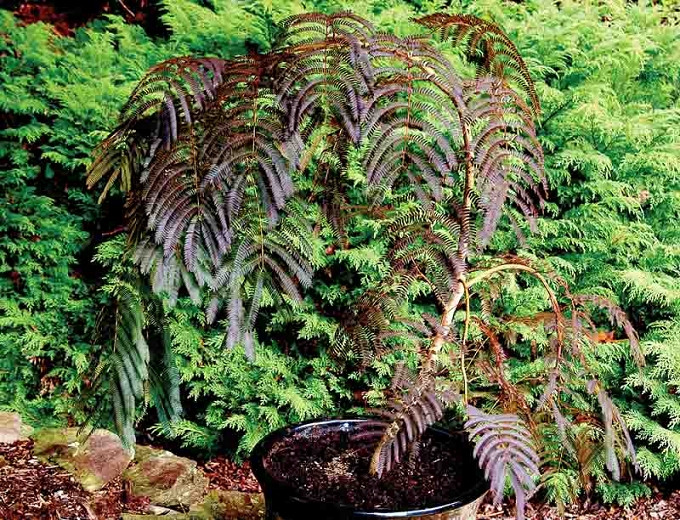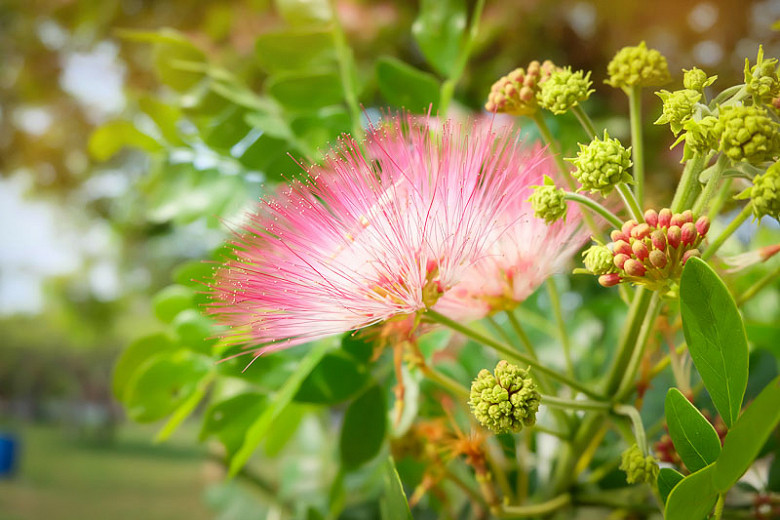Albizia julibrissin f. rosea (Pink Silk Tree)
Fast-growing, award-winning Albizia julibrissin f. rosea (Pink Silk Tree) is a small to medium-sized, deciduous tree with a flat-topped, spreading canopy of large, fern-like bipinnate, green leaves. Sensitive, the leaflets fold when touched and at night. Fluffy rose-pink, powder puff flowerheads, with prominent stamens, open in early summer and cover the tree until mid-summer.
Fast-growing, award-winning Albizia julibrissin f. rosea (Pink Silk Tree) is a small to medium-sized, deciduous tree with a flat-topped, spreading canopy of large, fern-like bipinnate, green leaves. Sensitive, the leaflets fold when touched and at night. Fluffy rose-pink, powder puff flowerheads, with prominent stamens, open in early summer and cover the tree until mid-summer. Fragrant, the blossoms are attractive to bees and butterflies. They are followed by flat bean-like seed pods, 7 in. long (17 cm), which persist into winter. A colorful and exotic-looking landscape tree that is most attractive as a multi-stemmed tree.
- Recipient of the prestigious Award of Garden Merit of the Royal Horticultural Society
- Grows quickly with an open habit, up to 20-35 ft. tall (600-750 cm) and 12-20 ft. wide (360-600 cm).
- A full sun lover, this plant is best grown in average, medium moisture, well-drained soils. Tolerates light shade, but the best flower production is obtained in full sun. Tolerates a wide range of soil conditions, including poor or alkaline soils. Drought tolerant and thrives in the high summer heat and humidity. Grows fast with regular water.
- Perfect for shrub borders, coastal gardens, or Mediterranean gardens.
- Pest-free, it is deer resistant. Keep an eye out for Verticillium wilt.
- Root semi-ripe cuttings with bottom heat in summer. Propagate by seed: collect seeds from pea-like pods and soften their coats in very hot water, leave to cool for 24 hours, and sow. After germination transplant into root trainers to avoid disturbing tap roots
- Albizia julibrissin species is native to China, Iran to Japan.
- Find where this species is invasive in the United States.
- Discover beautiful U.S. native plant alternatives.
Requirements
| Hardiness | 6 – 9 |
|---|---|
| Heat Zones | 6 – 9 |
| Climate Zones | 4, 5, 6, 7, 8, 9, 10, 11, 12, 13, 14, 15, 16, 17, 18, 19, 20, 21, 22, 23 |
| Plant Type | Trees |
| Plant Family | Albizia – Mimosas |
| Exposure | Full Sun |
| Season of Interest | Summer (Early,Mid,Late) |
| Height | 20' – 35' (6m – 10.5m) |
| Spread | 12' – 20' (3.6m – 6m) |
| Water Needs | Average |
| Maintenance | Low |
| Soil Type | Chalk, Loam, Sand |
| Soil pH | Acid, Alkaline, Neutral |
| Soil Drainage | Well-Drained |
| Characteristics | Fragrant, Plant of Merit, Showy |
| Tolerance | Deer, Drought |
| Attracts | Bees, Birds, Butterflies |
| Garden Uses | Beds and Borders |
| Garden Styles | City and Courtyard, Coastal Garden, Mediterranean Garden |
